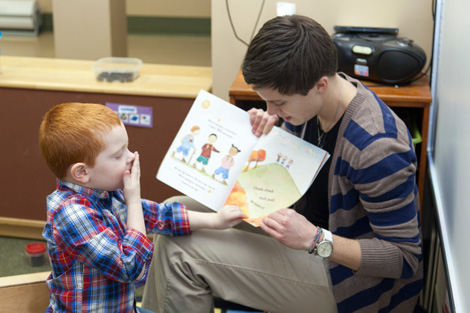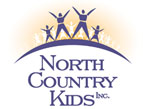Autism Services

North Country Kids is dedicated to providing the highest quality services to children with special needs and developmental disabilities, particularly those along the autism spectrum.
Our treatment approach includes evidence-based programming, family involvement and collaboration with other professionals that result in sustainable growth.
We pride ourselves on providing high quality Applied Behavioral Analysis (ABA) services employing the most evidence based treatment available. We are continually incorporating new treatment innovations and technical advancements into our treatment programs.
Individuals with Autism Spectrum Disorders (ASDs) show delays in communication and social interaction, and display unusual patterns of behaviors, activities and interests. Autism currently impacts 1 in 68 children.
Signs to look for
Early indicators include:
• No babbling (stringing sounds together to make
• sentences) by 12 months of age
• No gestures (pointing, waving bye-bye, etc.) by 12 months of age
• No response to their name by 12 months of age
• No single words by 16 months of age
• No two-word spontaneous phrases by 24 months of age
Difficulties with social interaction:
• May withdraw from others
• May not seek attention or actively engage with other people
• May not follow or try pointing to show interest in something
• May not turn to respond to their name
Communication problems:
• Difficulties in verbal (spoken) and non-verbal (gestures) communication. This
may range from no speech at all to full sentences that are odd in the way they are spoken or their meaning.
• Speaking style may appear robotic or scripted from TV, repetitive or “echoing”, use of words with no obvious meaning, or use of “giant” words (multiple words used as a single word – “whatisthis”)
• May not start talking until much later than their peers
Unusual behaviors, interest and activities:
• May have highly specific and focused interests (e.g.,obsessions with trains or maps) to the exclusion of other things
• May be very rigid in routines (taking the same route to school every day, playing with a toy in only one way, resisting schedule changes)
• May show repetitive actions such as hand-flapping, rocking, etc.
While there is currently no medical test or cure for autism, targeted Applied Behavior Analysis (ABA) therapy can help those diagnosed to learn how to better communicate, develop relationships, and participate fully and productively in family and community life, regardless of their age.
Applied Behavior Analysis (ABA) is the most effective treatment for children with autism. Over the past 50 years, thousands of published studies have documented the effectiveness of ABA for increasing a wide variety of skills and decreasing challenging behaviors. The goal of ABA is facilitate socially significant behaviors to allow individuals to have the best quality of life possible.
ABA is the scientific application of behavioral interventions that are based on principles of learning and motivation. The methods of ABA are applied by breaking down skills into simple steps and teaching each step in succession while taking quantitative and qualitative data to measure progress.
ABA can be utilized to teach communication, social interaction, cognitive skills and self-help skills. ABA strategies reduce inappropriate behaviors for people with autism and other developmental disabilities while teaching more appropriate replacement behaviors.
ABA is not a “one size fits all” approach. Intervention is customized to each child’s skills, needs, interests, preferences, and family situation. Therefore, an ABA program for one child might look different that a program for another child. Every ABA program for children with autism should include:
• Intervention designed and overseen directly by qualified, well-trained professional behavior analysts
• Detailed assessment of each child’s skills in all developmental domains
• Selection of goals that are meaningful for the child and the family
• Ongoing measurement of the child’s progress
• Frequent review of the program by the behavior analyst
• Instruction on developmentally appropriate goals in skill areas (e.g. communication, social, self-care, play and leisure, motor, and academic skills)
• Skills broken down into small parts or steps that are manageable for the child
• An emphasis on skills that will allow the child to be independent
• Use of multiple behavior analytic procedures – both adult-directed and learner-initiated – to promote learning in a variety of ways
• Many opportunities for child to acquire and practice skills every day, in structured and unstructured situations
• Intervention provided consistently for many hours each week
• Abundant positive reinforcement for useful skills and socially appropriate behaviors
• An emphasis on positive social interactions, and on making learning fun!
• Use of techniques to help trained skills carry over to various places, people, and times, and to enable child to acquire new skills in a variety of settings
• Parent training so family members can teach and support skills during typical family activities
• Regular meetings between family members and program staff to plan, review progress, and make adjustments
This treatment combined with an interdisciplinary team will facilitate long lasting, sustainable change that will result in enhanced functioning and quality of life. Our experiences staff utilizes the latest research and strategies to maximize learning including:
• Functional Behavioral Assessments
• Positive behavioral Supports
• Preference Assessments
• Visual Schedules
• Video Modeling
• Play Activity Schedules
• Social Skills Training
• Generalization Training
• Self-Management Skills
• Data Collection and Analysis
• Errorless Teaching
• Picture Exchange Communication/Augmentative Communication Devices
Birth to Three
North Country Kids provides comprehensive evaluations and services to children birth through 3 to meet the unique needs of the child and family. Services are provided in the natural environment which is typically the child’s home or daycare setting.
According to the NYS Clinical Practice Guidelines, intervention for young children should include an intensive behavioral and education intervention program. It is recommended that intensive behavioral programs include a minimum of approximately 20 hours per week of individualized behavioral intervention using ABA techniques (not including time spent by parents).
Preschool Services
North Country Kids provides evaluations and services to children 3 to 5 years of age. Three models of service delivery are available to families.
1) Home based program in the child’s home or preschool
2) Inclusive classroom 5 hours per day with 1:1 teacher to student ratio
3) Integrated classroom 5 hours per day 12:3 teacher to student ratio
Related services including speech, occupational therapy or physical therapy will be provided in the classroom setting. Children placed in classrooms with receive both individual and group instruction daily.
School Aged Children
North Country Kids provides direct services and consultation services to school aged children. Our behavior analysts will design and oversee intervention programs for children with ASD as well as other behavior and learning concerns. We provide home instruction, school consultation and behavioral support. We can assist with classroom design and implementing individualized programs for children.
We can provide:
• Functional behavior assessments
• Assistance with Individual program development
• Initial and/or ongoing consultation
• Home instruction
• Data collection and analysis
North Country Kids believes parents are the experts regarding their children. Providing effective treatment to children with developmental disabilities requires a partnership between staff and parents. In the home setting parents are encouraged to be actively involved in their child’s therapy sessions. For children enrolled in a classroom setting, parent meetings are held monthly or more frequently if needed.
Parent workshops are provided on a variety of topics-adaptive skills, behavior management, cognitive development, language disorders, as well as play and social skills-in an effort to increase parent involvement and empowerment.

 North Country Kids, Inc.
North Country Kids, Inc.
 Fax 518-561-3805
Fax 518-561-3805